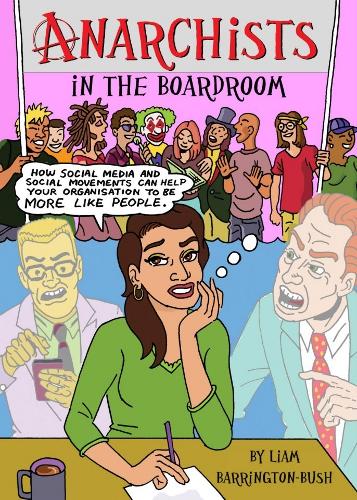 Like the author of this book, I’ve had the experience of working for a large NGO (non-governmental organisation) and, in the process, becoming de-skilled, de-motivated, uncreative and disempowered.
Like the author of this book, I’ve had the experience of working for a large NGO (non-governmental organisation) and, in the process, becoming de-skilled, de-motivated, uncreative and disempowered.
After a couple of years of struggling with hierarchy and unimaginative bureaucracy, I left to do more activism, study for an art degree, and work part-time for a small start-up charity where my skills have been appreciated and nurtured. So naturally I was keen to crack open my copy of this book, and I was well rewarded!
Anarchists in the Boardroom is an enthusiastic, readable, open and honest call-out to NGOs to change their ways of working, to nurture creativity, and to learn from social movements and social networking.
At its heart are three principles, which together form a pattern and the basic premise of Barrington-Bush’s ‘more like people’ approach. He believes that non-profit organisations have become ‘over-professionalised’ and need to nurture and make space for ‘humanity’, ‘complexity’ and ‘autonomy’. These principles are based on learning from relationships, anarchism and ecology.
‘Humanity’ means learning from how we do — and how we would like to — relate to each other.
‘Complexity’ means understanding that we are part of a larger system, that each of our actions has effects and consequences we cannot foresee — and that organisations need to embrace this and bravely open up to the creative possibilities of unforeseen consequences.
‘Autonomy’ is about trust, and realising that although trust means taking risks, it can bring rewards. As with all great insights, this set of principles is remarkably simple, and, once you’ve read it, you’re left wondering why it hasn’t been said before.
The author goes on to demonstrate the value of his basic principles, exploring key areas in which non-profit organisations need to change their approach: by dismantling hierarchy, addressing difference and going beyond diversity, making space for innovation and creativity, confronting ownership and disempowerment, and looking at organisational culture.
Dotted throughout are exciting and inspiring stories from the frontlines of social change: the Occupy movement, Oaxaca in Mexico, the INCITE women of colour anti-domestic violence project in the US, as well as case studies of NGOs that do things differently, like Platform and People and Planet.
At the core of all of it is an almost evangelical promotion of social media — as a tool, as a means of communication that can open up new relationships and ways of working, and as a model for the free flow of ideas and connections and the way that randomness can lead to new, world-changing initiatives.
The book’s not perfect, of course. For one thing, it’s patchy and uneven in its spread of case studies — some chapters are bursting at the seams with well-told stories; other chapters are heavier on the theory and leave you wanting more engaging narratives and real-world examples. And it’s also not clear whether the book is for workers or managers — at different times each audience is addressed directly with the author talking about ‘we’ all the way through. Whose side is he on? Although I guess a riposte to that might be that it reveals my old-school thinking of them and us.
Which brings me to my remaining concern.
On the plus side, it introduces anarchism as practical, positive and creative to readers who may have avoided anything to do with the ‘A’ word as irrelevant, idealistic or destructive (or all three!). But in the end, although it opens a door into a way of thinking that could turn organisational culture and practices upside down, it doesn’t go far enough.
This is most noticeable in the chapters on diversity and difference, and on accountability and trust, where the analysis of the problem doesn’t get as far as looking at the context in which organisations exist.
Just as it’s not enough for us to change our light bulbs to slow climate change (if that’s even possible), our workplaces won’t change if the system doesn’t change. And no amount of understanding conflict or diversity will make that happen without a recognition that the fundamental problem is that organisations both reflect and perpetuate the social and political structures which produce them.
But you should still put a copy of this book on your manager’s desk.


